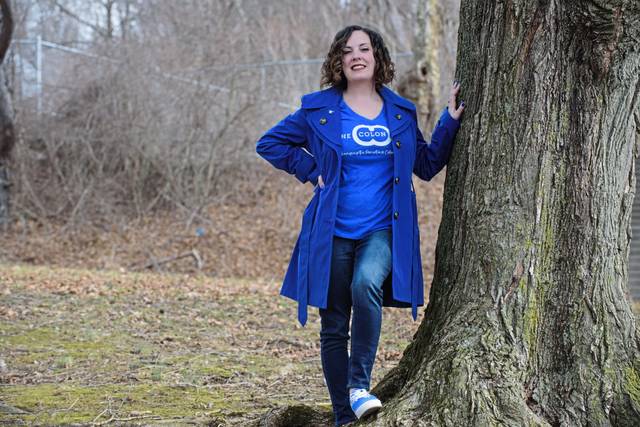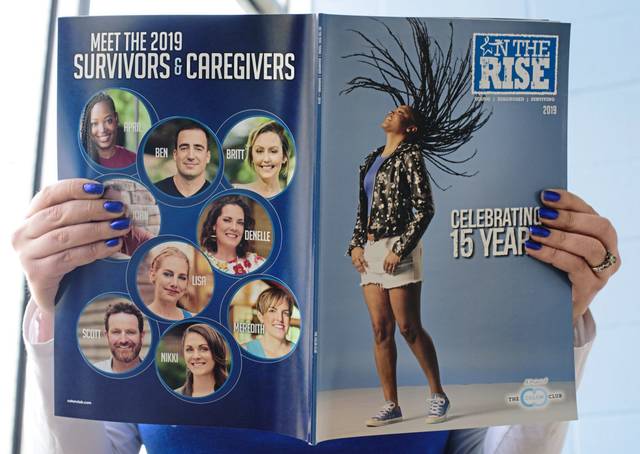Denelle Suranski is sharing her story in hopes of saving lives.
Suranski, 35, an advocate for colon cancer prevention and awareness, faced her own diagnosis as a teenager. Now the White Oak resident is offering the details of her cancer battle through a feature in “On the Rise,” the national magazine of the nonprofit The Colon Club, with the aim of encouraging others to pay attention to their health.
“Colorectal cancer is the second leading death-causing cancer,” said Suranski. “It’s humiliating and embarrassing, and we need to break the stigma of that and talk about it more.”
The Colon Club’s mission is to educate people about risk factors, genetic precursors and symptoms of colorectal cancer, and connect young adults who suffer from the disease.
With colon cancer on the rise in people under age 50, Suranski’s story is especially important to share, said Trish Lannon, president of The Colon Club.
“When you’re in the fight, you don’t necessarily see the light at the end of the tunnel,” she said. “When you have people that have many years under their belt, it gives you a feeling that you can fight and you can live.”
Suranski began experiencing symptoms of the cancer, which many think of as an “old man’s disease,” at age 17. She was constipated and had blood in her stool.
She went to the doctor several times and was told she had internal hemorrhoids.
Two years passed, and the symptoms only worsened. Suranski was so tired, she would come home from work and collapse.
Her father’s own diagnosis with colon cancer four years prior was a red flag Suranski could not ignore. She finally made a list of her symptoms, took them to her doctor and demanded to be taken seriously.
Tests revealed she had stage II colon cancer.
Originally, doctors told her treatment would involve removing her colon and giving her a colostomy bag, which would be surgically attached to her and collect waste from the body.
Instead, she found another doctor who reconstructed her J-Pouch, a surgically-created reservoir to store and pass waste. However, she had to have a temporary ileostomy, where her small intestines were looped outside of her skin.
Waking up from surgery to that sight at 19 was nearly more traumatic than hearing she had cancer, Suranski said.
“That was so painful — emotionally it was awful,” she said.
She went through chemotherapy, radiation and numerous other procedures.
Yet even after the disease no longer was present in her body, Suranski’s battle continued.
She found she also has Lynch Syndrome, an inherited condition increasing the risk of getting several other kinds of cancer, including endometrial, stomach, small-intestine, liver, gallbladder, upper urinary tract, brain and skin.
Early on during her cancer fight, Suranski suffered from suicidal thoughts. She still lives with anxiety and depression and sees a therapist to help cope with the long-term effects of the chemotherapy and the fear she could get sick again.
She also continues to have health problems. She’s postmenopausal and has had radiation vaginitis, vaginal stenosis, a hiatal hernia, gastritis and an appendix removal. She had a hysterectomy at the age of 31.
“You think, ‘Oh, she beat cancer, she’s happy, she’s living a healthy life,’ but it’s not the case,” Suranski said. “I feel empty inside sometimes.”
But, with the help of The Colon Club, she feels like she’s “gained a new lease on life.”
Through the organization, Suranski attended a retreat in Tennessee with other young adults who have or had the disease. They shared their stories, made lifelong friendships and learned how to advocate and bring awareness to colorectal cancer.
“It’s also given her a voice she didn’t have before,” Lannon said of the change she’s seen in Suranski since the retreat.
The nine people at the retreat were featured in this year’s “On the Rise” magazine, in which they shared their stories and showed their scars to the world. Participating in the feature is just one way Suranski is working to raise awareness for the disease.
She was active in getting Pittsburgh and Pennsylvania to declare March as Colorectal Awareness Month for 2019 and asked local businesses to light their buildings blue throughout the month. She also has planned several sold-out fundraisers to help spread the word.
Suranski’s goal is simple. She wants to “help at least one person to get screened or to make sure that they listen to their body.”













